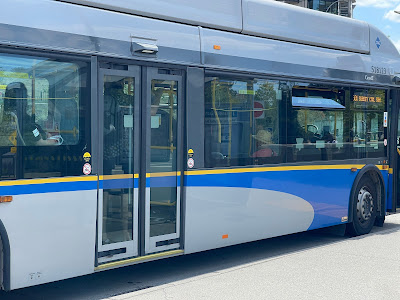TransLink recently released its annual Transit Service Performance Review. This review highlights various metrics from a high level to a route level for Metro Vancouver's transit system.
At a high level, transit ridership continued its rapid approach 2019 levels, with the South of Fraser, Pitt Meadows and Maple Ridge leading the way with ridership essentially back to 2019 level.
While Vancouver had a slower ridership recovery, it was still the area with the largest share of ridership in the region.

|
| Share of ridership by sub-region, Fall 2022. Select the graph to enlarge. |
Now it is great that people are taking transit and that Metro Vancouver is the 5th busiest transit system in Canada and the US, but our transit system is starting to get overcrowded again.
As a weekday commuter in 2019, I remember that during the busiest parts of the afternoon, I sometimes could only get on the SkyTrain at Main Street if I jammed myself onto the train. I also sometimes had to skip a bus at Surrey Central and wait for the next bus because it was full.

|
| Average weekday overcrowding on the bus network comparing 2022 to 2019. Select the graph to enlarge. |
Back in 2019, we were trying to resolve overcrowding issues on the transit network, which we again need to work on. As shown in the preceding graph, overcrowding grew steadily in 2022.
Over the last two years, TransLink has reallocated service from less busy routes to busier routes to address overcrowding while maintaining a good ridership experience. For example, a route running every 7 minutes might have changed to run every 9 minutes to help reallocate service hours to an overcrowded route. TransLink is at the point now where reallocation could start negatively impacting ridership experience.
Since 2020, the provincial and federal governments have provided direct operating grants to keep our transit system running. This March, the provincial government committed another $479 million to maintain current transit service levels.
One of the challenges for the Mayors' Council on Regional Transportation, which I'm a member, is to eliminate reliance on this direct operating grant from the provincial government by finding shorter-term replacement funding sources. We must also work on a "new deal" for transportation funding for our region to ensure that we can continue to grow transit service to reduce overcrowding, increase areas with access to fast, frequent transit service, and invest in state-of-good-repair projects.


No comments:
Post a Comment